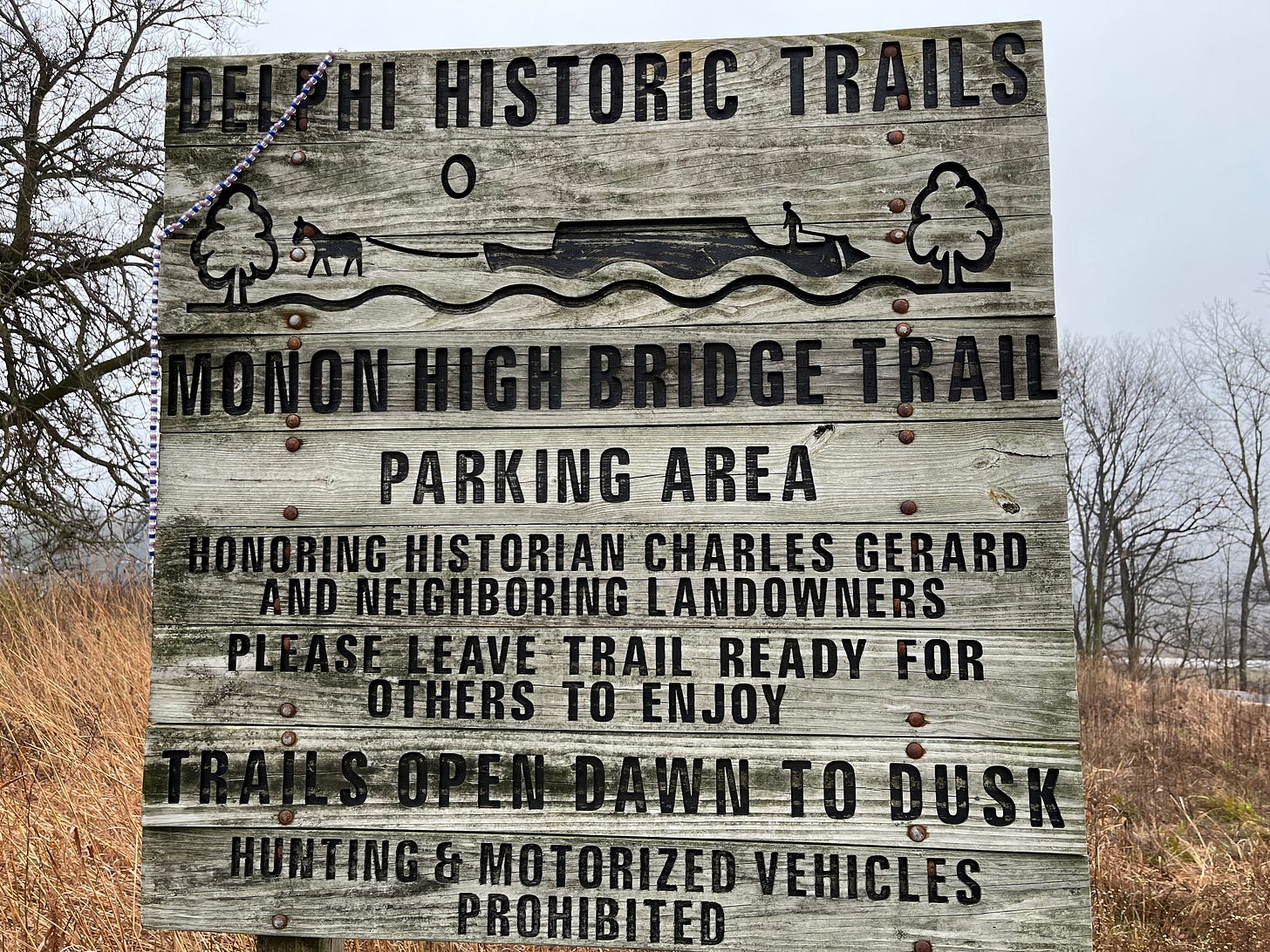This and that on a Monday
Still buzzing after Yo-Yo Ma interludes at Purdue. New projections on Third/Fourth street two-way conversions. Prosecutor pushes back on defense effort to take jurors to Delphi murder scene. And more
This edition is sponsored by Duke Energy, promoting Greater Lafayette Commerce’s Manufacturing Week Sept. 30-Oct. 4. The annual Manufacturing Week brings awareness to the community about manufacturing in the Greater Lafayette region, including classroom events and activities designed to educate students on career pathways available to them. For more information, check www.greaterlafayettecommerce.com/manufacturing-week
STILL BUZZING AFTER YO-YO MA INTERLUDES AT PURDUE
What a treat it was to have Yo-Yo Ma playing interludes at Elliott Hall of Music during at Presidential Lecture Series event that had the cellist in conversation with PBS NewsHour arts correspondent Jeffrey Brown.
The talk leaned into notions of the importance of arts in the realms of science, and vice versa, and being open to influences by keeping an open ear. Ma punctuated that last point with a medley inspired by assorted traditions and eras, pulling together sections of “Simple Gifts,” a 19th century Shaker song Aaron Copland built into the score of “Appalachian Spring;” the hymn “Amazing Grace;” the spiritual “Nobody Knows the Trouble I’ve Seen;” and Antonin Dvorak’s “Theme from New World Symphony.”
His point: “This is a school where actually all of you can meet one another from various sectors, disciplines, geography. And by meeting, you’re suddenly exposed to somebody else’s imagination, someone else’s values. Well, how do you do that in physics? How do you do that in engineering? How do you do that reading Plato? … What were the Greeks thinking about the world? And how are we thinking about it today? That’s what those four pieces are sort of like that kind of interaction.”
To an Elliott Hall of Music peppered by plenty of students, clearly enthralled by Ma and the sprawl of his classical and popular work, he got into expectations amid waiting for that what-do-I-want-to-be moment that doesn’t always come with youth.
Brown asked Ma when he knew he wanted to be a musician. Ma had talked about starting at age 4, encouraged and pressed by what he described as not one, but two “tiger parents.”
Ma, who turns 69 in a week, said that realization came when he was 49, as he settled into a mantra of being human first, musician second and cellist third.
“Because I started at such an early age, I never had to kind of make the decision to say, ‘This is what I’m going to do,’” Ma said. “ I just fell into it.”
What happened at age 49, Brown asked.
“I spent the years prior to 49 going around playing concerts, loving music, loving the people that I met, loving each country that I visited, every city, every state, just asking questions,” Ma said. “How do people act this way or that way, or talk this way? And what makes this community alive? It’s football in this community. Food in another community. What started it?
“I was interested in all that stuff and always thinking maybe I should be doing this, maybe I should be doing that, and not thinking about what I was doing. I was always worried that what I was doing in music is not useful. You know, people are hungry, people worry, and I thinking I’m not helping.”
He went on: “Over the years, I’ve learned that I actually care about a lot of things. And at 49, because I’m a slow learner, I realized all the things that I care about, I can actually do through the lens of my music. That’s when all of those interests – cultures, languages, people, the economy, politics, you know, astronomy, science – you can actually go do that and continue to be interested and learn. And by learning, I actually improve my playing as a musician. There’s a circular theme that goes on, because I’ve asked myself in my 20s and 30s, How do you improve? How do you get better? What are your goals?’ Should I play faster? Should I play louder? Should I play slower? Should I play deeper? How do you do that? Do you practice more? I didn’t know. And it took all those years to figure that out.”
Before leaving the stage by pumping his fist, bow in hand, in a campus chant, “Boiler up!” Ma played Bach’s “Prelude from Cello Suite No. 1 in G Major,” complete with audience participation. Ma invited the crowd to stand and hum a single deep note, repeated through the work, as performed the piece a second time. Elliott Hall of Music buzzed from the audience voices in the moment, as Ma encouraged a crescendo just loud enough to accompany, not to overwhelm the cello.
There were a few tears in the seats afterward. And he’d been worried that what he was doing in music wasn’t useful.
PURDUE FOOTBALL LETS OFFENSIVE COORDINATOR GO: Frustrations boiling over for Purdue football went all the way to the top after Saturday’s penalty-heavy, offensive-shy 28-10 Homecoming loss to Nebraska. The J&C’s Sam King had the reaction from head coach Ryan Walters, in all its crumpled stat sheet postgame glory: “Walters vents frustration after Purdue football loses to Nebraska.” On Sunday, Purdue dropped the hammer on offensive coordinator Graham Harrell. Indianapolis Star reporter Nathan Baird opened his account this way: “Coming out of a loss at Oregon State, coach Ryan Walters said Purdue football had to be ‘the most improved team in the country in a week.’ The Boilermakers only got halfway there.” Here’s Baird’s full story on Harrell’s firing for the 1-3 Boilers: “With Purdue football's offense undermining other progress, Ryan Walters had to act.”
PROSECUTOR ARGUES AGAINST TAKING JURORS TO DELPHI MURDER SCENE: Carroll County Prosecutor Nick McLeland late last week pushed back on a defense motion to take jurors to the scenes key in the 2017 murders of Delphi eighth-graders Abby Williams and Libby German during the trial of Richard Allen. Attorneys for the 52-year-old former CVS clerk filed a motion last week, asking the court to allow jurors to get firsthand view of the Freedom Bridge – which runs over Indiana 25/Hoosier Heartland Highway as a centerpiece of Delphi’s trail system – the Monon High Bridge and the site on private property near Deer Creek where the girls were found a day after being dropped off to walk the trail. McLeland objected in response, saying that the request involved going across two pieces of private property that “the terrain where the bodies were found is very difficult to traverse and would be dangerous for the jury to get to.” He also argued that the sites are “substantially different from the time the crimes occurred” and that getting jurors there “would require a substantial amount of time and resources to take the jury to those areas while ensuring that they are sequestered from the public and outside influences.” McLeland’s motion argued that jurors already would have access to maps, exhibits and drone footage of the scenes in question. Last week, Judge Fran Gull issued an order that she would hold a hearing after jury selection – expected to run from Oct. 14-16 in Allen County – to hear arguments about whether to take the jurors to the crime scenes. Jurors will be brought to Carroll Circuit Court in Delphi for the duration of the trial, expected to stretch into mid-November, according to the court’s schedule.
THIRD AND FOURTH STREET TWO-WAY CONVERSION UPDATE: Traffic light poles that have held up the realignment of Third and Fourth streets from one-way to two-way through downtown Lafayette were expected to arrive late last week, Dennis Carson, the city’s economic development director, told the Lafayette Redevelopment Commission. Delays in getting the equipment kept the $1.94 million project from finishing as first scheduled before the start of Purdue’s fall semester in August. Carson said crews were expected to start installation this week, with a new completion date expected by the end of October. The plans include two-way traffic on Third and Fourth streets, between Wall and Alabama streets, including stretches that run on either side of the Tippecanoe County Courthouse. The city began talking about the project more than a year ago, in a position to convert the streets once they no longer were considered state roads. The state relinquished responsibility for Third and Fourth streets during the first phase of the U.S. 231 bypass project, which was in 2001, according to records kept by the Tippecanoe County Area Plan Commission.
WEST LAFAYETTE SCHOOL BOARD CANDIDATE FORUM MONDAY: Candidates for West Lafayette school board are scheduled for a forum at 6:30 tonight — Monday, Sept. 30 — at West Lafayette City Hall, 222 N. Chauncey Ave. The election will have six candidates, including two incumbents, up for four seats on the seven-member board. On the ballot in the nonpartisan race: Incumbents Amy Austin and Yue Yin, along with Maria Koliantz, George Lyle, David Purpura and Beau Scott. The forum will be moderated by David Sanders, a West Lafayette City Council member. For more on the candidates: “Crowded fields: Meet the LSC, West Side school board candidates.”
SHOWINGS ADDED FOR ‘GOD & COUNTRY’ DOCUMENTARY: We All Belong Greater Lafayette – a group that touts itself as “committed to counter the intolerance and harm to others and the U.S. Constitution by Christian nationalism” – will host two showings of “God & Country” in coming weeks at various Greater Lafayette locations. The film, produced by Rob Reiner, is based on author Katherine Stewart’s 2019 book, “The Power Worshipers: Inside the Dangerous Rise of Religious Nationalism.” The showings include 6:30 p.m. Monday, Oct. 7, at The Arts Federation, 638 North St. in Lafayette; and 1:30 p.m. Sunday, Oct. 27, at St. Andrew United Methodist Church, 4703 N. County Road 50 West in West Lafayette. Admission is free.
Thanks, again, for sponsorship help from Duke Energy, promoting Greater Lafayette Commerce’s Manufacturing Week Sept. 30-Oct. 4. Learn more at www.greaterlafayettecommerce.com/manufacturing-week
Thank you for supporting Based in Lafayette, an independent, local reporting project. Free and full-ride subscription options are ready for you here.
Tips, story ideas? I’m at davebangert1@gmail.com.






Once 4th Street is available two ways, I encourage everyone to use it as a joyful alternative to South 9th Street. Experience your heart leaping with joy as you drive on 4th Street. Find a sense of peace driving on South 4th Street. Why continue to use South 9th, which gets so congested at Teal and backs up for blocks and blocks? 4th Street is indeed your ticket to JOY!
I very much hope that the academic leaders of Purdue were in the audience for Ma's discussion, because so often the leadership of Purdue treats everything that is not engineering or comp sci as disposable and superfluous. Humanities, arts, social sciences, these are all essential components of a university education and they do matter. They matter in a practical sense (you can't make things that matter for a global audience if you don't bother to learn about people and society and cultures), but they also matter in our growth as human beings, our ability to engage with ideas, our search for meaning. What a beautiful personal story on his part.